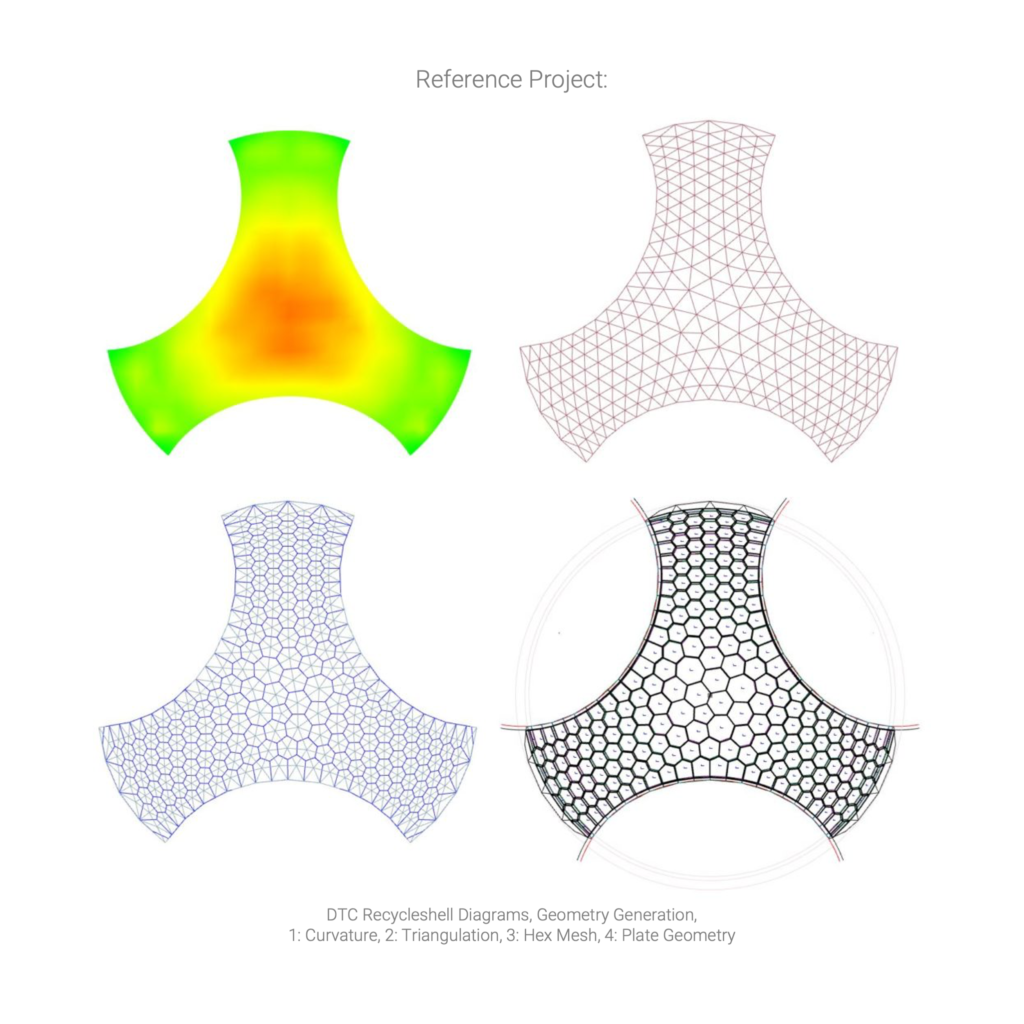A Form-finding Method for Trivalent Polyhedral Timber Plate Structures
Instructors: Amin Adelzadeh
Guest Speaker/Critic: Prof. Dr. Christopher Robeller / Dr. Hamed Karimian
Dates: 22, 23, 24 July, 10:00-12:00/13:00-15:00 CET
Total Hours: 4 hours per day (total 12)
Themes: Form Finding / Computational Design / Fabrication
Software: Rhino 7 / Grasshopper / Kangaroo
Number of Students: 60
Workshop full please watch live stream



Description:
The workshop focuses on the computational aspect of such construction system where geometric constraints has to be solved. Among others, the geometric pattern of facets plays a key role in the quality of discretization, planarization and more importantly generation of plates in the free-form segmented timber plate structures; accordingly, during this three-day workshop, the trivalent polyhedral patterns are deeply studied as the most efficient solution for plate generation for such structures with positive and negative surface curvatures. It is expected that the participants will gain basic knowledge of the timber plate construction systems, material systems, automated joinery, rapid and precise assembly, and will improve computational skills in developing modeling workflows consisting of form-finding, discretization, rationalization, joint generation, and fabrication data production. The acquired knowledge and skills would benefit research and practices in the timber plate construction systems.
Philosophy:
The workshop is derived from the extension of the work from our previous study on using digital technology to construct lightweight wood-only shell structures made from Cross-Laminated Timber (CLT) production waste (offcuts) which are too small for the regular building applications (Robeller and Von Haaren. 2020). For the first time, these CLT offcuts were used as a high-quality timber plates, and turned into a segmented shell structure “Recycleshell”, by using algorithmically-generated form-fit wedge-edge connectors and wooden dowels. Inspired by such a research philosophy, this workshop aims to provide fundamental knowledge and essential computational skills for the design-to-assembly of lightweight segmented wood-only shell structures made of timber plates.
Other Requirements:
The workshop is taught at the intermediate level. The participant should have the following tools, skills, and abilities prior to registering for this workshop:
(Mandatory)
- English language proficiency at B2 level or higher
- A computer with a webcam, microphone, and an efficient internet connection, enabling participants to stream videos with sound and to effectively participate in video chats
- Basic understanding in at least one of the following disciplines: architecture, civil engineering, construction, computer science, wood technology, or similar fields
- Familiarity with computer environments (what is a program, file system, file formats)
(Preferred)
- Basic knowledge of computational design and digital fabrication
- Basic knowledge of timber prefabrication
- Preliminary skills in using Rhino3D, Grasshopper, and Kangaroo Physics
- Preliminary skills in any 2D or 3D diagrammatic presentation program
- Prior experience in any design planning, modeling, or scripting tools
- Experience in CNC or robotic fabrication data production is not required, but will be an advantage
Reference Project:
The application of Cross-Laminated Timber (CLT) in the building industry has a major role in shaping the recent renaissance in timber construction, however, despite the benefits, the CLT fabrication produces a huge amount of offcuts that despite the high quality are too small for the timber building applications. For the first time, these CLT offcuts were turned into a segmented shell demonstrator “Recycleshell”, by using algorithmically-generated form-fit connectors and screws. Inspired by such a research philosophy, this workshop aims to provide fundamental knowledge and essential computational skills for the design-to-assembly of lightweight segmented wood-only shell structures made of CLT plates.



For more information:
https://www.architektur.uni-kl.de/dtc/2019/09/05/recycleshell/
Reference paper:
Robeller, C. and Haaren, N. V. (2020). “Recycleshell: Wood-only Shell Structures Made from Cross-Laminated Timber (CLT) Production Waste.”, Journal of the International Association for Shell and Spatial Structures, vol. 61: 125–139.
Instructors:

Amin Adelzadeh:
Amin is an architect, educator, and currently, a Research Associate working on the FNR-BMEL Timber Structure Interface .TSI research project described as the development of a data interface for the automated structural analysis of the novel, digitally prefabricated timber structures with wood-wood connections, federally-funded by The Agency for Renewable Resources e. V. and currently hosted by the Augsburg Technical University of Applied Sciences in Germany. Previously, he had varied research and/or teaching duties at the Chalmers University of Technology in Sweden, Bremen University of Applied Sciences, Technical University of Kaiserslautern, University of Mazandaran, and Politecnico Di Milano. He has taught design studios, seminars, and CAD-CAM workshops at different universities and conferences like ACADIA 2022 at University of Pennsylvania, USA, and CAADRIA 2023, and held lectures internationally. His work has been published and presented at different conferences including IASS, eCAADe, DigitalFUTURES, The Future of Construction Symposium at ETH Zurich, International Mass Timber Conference, FNR, LIGNA and BAU, among others. Amin has been the curator of the “Digital Architecture and Advanced Construction” lecture series at University of Mazandaran in Iran where he moderated a number of lectures by high-profile educators and researchers from the ICD, TU Delft, Columbia GSAPP, Rhode Island School of Design, California College of the Art, Cooper Union, Washington State University, SUTD, and Ohio State University. His current research focuses on the development of hybrid timber systems for robotically-fabricated shell structures. He holds a Master of Science degree in Architecture from Politecnico Di Milano in Italy and has been the recipient of several merit-based scholarships.


